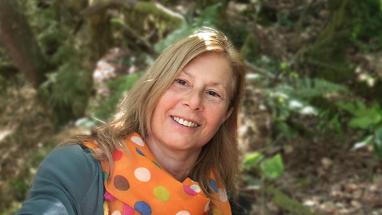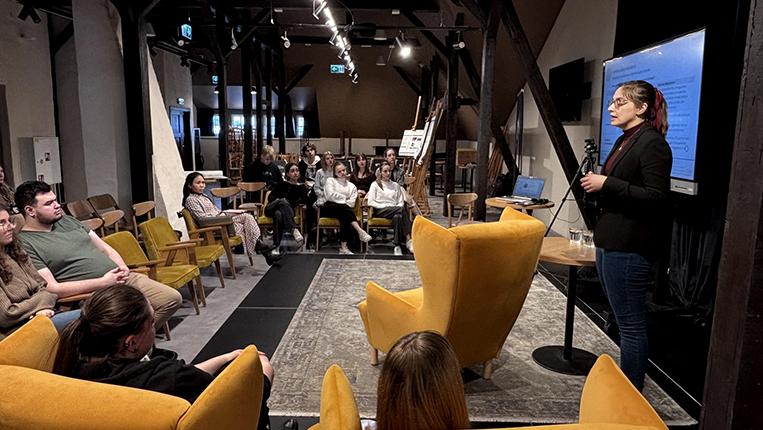
Professor and researcher at the Higher School of Biotechnology, Fátima Poças coordinates CINATE, the Food and Packaging Analysis and Testing Laboratory, recognized by the Ministry of Agriculture as a reference laboratory in materials in contact. She has dedicated her life to Packaging work and research, an area she describes as “versatile and broad”. Some of this area's major challenges are recycling and knowledge throughout the chain. In her free time? Lots of sport and always dreaming about the next trip.
You have dedicated your life to the study of Packaging. How did this path come about?
I graduated in Chemical Engineering and, at some point in the last year of the course, a professor, who guided training activities in companies, challenged me and another colleague to train employees at the Triunfo biscuit factory in Coimbra. During this period, in addition to learning a lot, I realized that Packaging is a fundamental area in the industry and that it is, in itself, a subject of study.
That is the area you still embrace today…
It was at the Faculty of Biotechnology that I was challenged to create a center dedicated to Packaging. From then on, I dedicated my entire life to this area.
“Thinking about packaging involves thinking transversally and globally.”
What fascinates you?
The versatility and the broadness. We work on all components, from material science to the system that protects the food, and the impact on the environment, among others. Packaging involves thinking in a transversal and global way. All elements have to be weighed and there are many criteria to consider. When I started, Packaging was a very unconsolidated area. Little was known; little was invested. The Faculty of Biotechnology was an exception and a pioneer. We were the first college to have a subject called Materials and Packaging.
Is it a multidisciplinary area?
Yes, because it involves several areas and you need to know a little about everything and be able to connect and gather knowledge, thinking about the elements of the entire system. I think that's what I like the most. I'm a pretty horizontal person who likes to take a little from each area.
What are the major challenges this area currently faces?
The main challenge is knowledge of the chain, from the production of materials to the consumer. Lack of information is a major limitation that prevents things from being done more sustainably. Consumer participation in recovery systems is essential. There is a lot of talk about biodegradable packaging and materials, but it seems to me that, in food packaging, recycling is much more important. Implementing this practice is still a major challenge. It requires consumer intervention and for the consumer to intervene he must know what he is doing and why he is doing it. In the food industry, it is also necessary to be aware of the impacts of packaging at various levels. Knowledge must be present throughout the chain - from the food industry that selects the material to the retailer and, finally, the consumers themselves. If information flowed better, and with good inventory management, we wouldn't need such long expiration times. The flow of knowledge along the chain is a major challenge. It is the lack of knowledge that creates major limitations in implementing better solutions.
“As CINATE coordinator, I always have many practical cases to share with my students.”
Is this a topic that attracts students' interest?
The Faculty of Biotechnology mainly attracts students from the European Master of Science in Sustainable Food Systems Engineering, Technology, and Business. I always have classes with a good number of students. One of the things I like most is that some of the students later return and do their master's thesis. In this master's degree, students can choose the country where to carry out their thesis. It is always gratifying when students choose a thesis related to this field. There are even some who then stay on for a PhD.
How do teaching and research feed off each other?
I don't separate them. The classes I teach are always practical and related to reality. We visit companies, rely on the intervention of specialists from different areas, and study-specific cases from the industry. As CINATE coordinator, I always have many practical cases to share with my students.
“We are a private laboratory, and we maintain this position to this day, continuing to be the reference laboratory at a national level.”
What is CINATE's activity?
CINATE - Food and Packaging Analysis and Testing Laboratory - is a structure of the Faculty of Biotechnology. We provide services and that is where much of the practical knowledge I bring to my students comes from. We have a very comprehensive performance. Every day we deal with the needs of companies, whether they are food or packaging companies in their various aspects, we carry out quality control, support diagnosis, and problem-solving, and develop shelf-life studies and small research projects.
What sets CINATE apart?
In 2004, we were recognized by the Ministry of Agriculture as a reference laboratory in contact materials. It was at the time when a European law was passed that determined that each Member State should have a national reference laboratory for this area. We are a private laboratory, and we maintain this position to this day, continuing to be the reference laboratory at a national level. At CINATE, we are on many fronts, and this is very challenging and, without a doubt, sets us apart, because it gives us a lot of diversity of knowledge and skills. We are currently a team of 16 people. A large and very committed team.
How do you manage the team on a day-to-day basis?
With a lot of work and a lot of discipline. There are almost always days dedicated to specific projects, which helps us organize our work.
“Diving is like meditating.”
What do you like to do in your free time?
I do a lot of activities. My problem is that I always like too many things. (laughter)
I participate in various sports. I play volleyball on the beach twice a week whenever the weather permits. I also go to the gym and scuba dive. I like traveling.
What do you seek to learn from your dives?
I am immensely fascinated by animals and plants. I've always been obsessed with snorkeling and would always go around with my fins and mask on. In 2015, I ventured into a diving course. Diving is like meditating.
Dives to remember?
In Australia, diving in the Great Barrier Reef.
Last trip?
Indonesia.
Packaging
Maybe Japan. Not for the diving, although I will take advantage of that too, but for the culture.
What moves you?
The commitment I owe to those who in some way depend on me. Whether with the people who make up my team at work, with the researchers and students I supervise, or with my family. It's this responsibility and commitment to be there for them that gets me out of bed every day.
Pessoas em Destaque é uma rubrica de entrevistas da Universidade Católica Portuguesa, Centro Regional do Porto.




